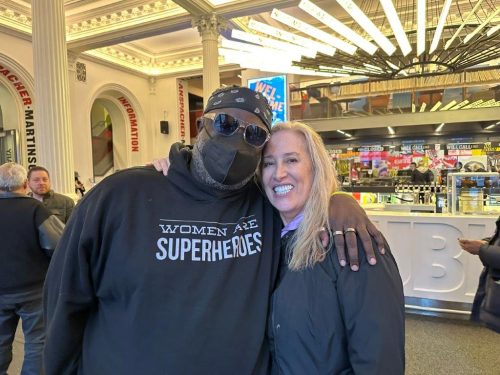
Susan Gurman and Tyler Merritt at Alicia Keys’ Hell’s Kitchen


Running January 25 – February 18th, get your tickets HERE.
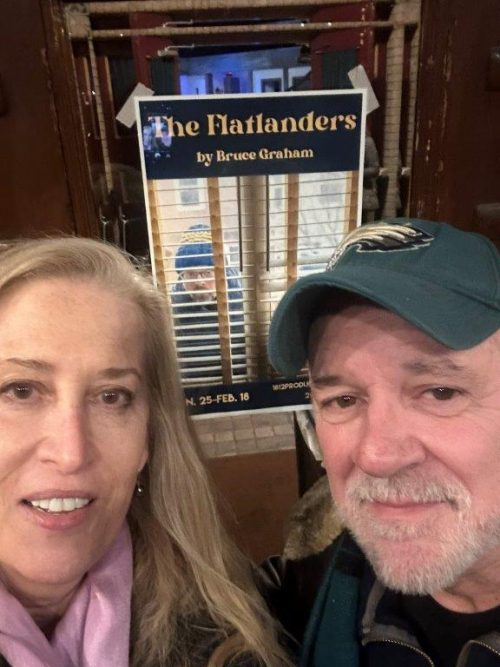
“Childs and Greer’s comic skills have only grown with time, and they give ample evidence here of their status as Philadelphia living treasures”
-Philadelphia Magazine

The Flatlanders
Written by Bruce Graham
Starring Jennifer Childs and Scott Greer
Directed by Matt Pfeiffer
A Poconos blizzard puts a chill on a couple’s relationship in this brisk comedic romp. Stuck in a cabin belonging to total strangers, “flatlanders” Ronnie and Michael uncover truths, secrets, and new ways to heat things up between them. But will their relationship weather the storm?
Learn more here.
KANSAS CITY, Mo. —
The Coterie Theatre in Kansas City officially has new artistic leadership.
On Wednesday, the acclaimed children’s theater announced that Khalia Davis will be stepping into the role of Producing Artistic Director.
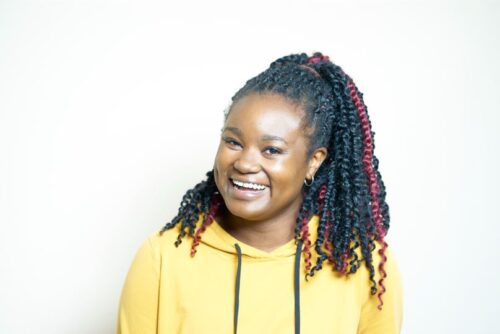
Davis inherits the role from interim artistic director Heidi Van, who has led artistic programming since February of 2023 following the resignation and sudden death of Jeff Church in December of 2022.
Davis will work alongside Managing Director Jonathan Thomas, who joined The Coterie in April 2022 as director of development and served as interim managing director since November 2022 before being permanently appointed to the role following the passing of longtime Coterie executive director Joette Pelster.
The theater called Davis a multidisciplinary artist and arts leader in a press release announcing her appointment. She most recently served as the Assistant Director for the Broadway-bound world premiere of The Hippest Trip: The Soul Train Musical.
“From our first introduction to Khalia to the everyday interactions, her energy and passion for theatre for young audiences is palpable,” President of The Coterie’s Board of Director Theresa Stoker said. “We know she will continue to do exciting and innovative work in the field of theatre for young audiences and we are thrilled to have her co-leading The Coterie.
She also comes to Kansas City as the former Artistic Director of the Bay Area Children’s Theatre in Oakland, California. She led the world premieres of a kids play about Racism, which brought together over 40 theater producing partners, including The Coterie, and was viewed on Broadway on Demand nearly 80,000 times during its limited run.
“While I am not from Kansas City originally, witnessing the way the arts community here supports and uplifts one another is reminiscent of living and working professionally in the San Francisco Bay Area theater community,” Davis said in the theater’s press release. “I look forward to working with new colleagues across the arts industry here and working alongside managing director, Jonathan Thomas, to bring more exciting, engaging, and educational arts programming to the families and young people of Kansas City and beyond!”
Davis will look to begin a new era for the beloved children’s theater, which touts being named “One of the Five Best Theaters for Young Audiences” in the U.S. by TIME magazine.
The Coterie offers acting and theatre classes year-round for PreK-12th grades at multiple locations around Kansas City. The not-for-profit theater company also serves an average audience of 75,000 annually across 350 performances.
Assault and abuse allegations were made public against former longtime Artistic Director Jeff Church in a story by the Kansas City Pitch. Additional unconfirmed claims and accounts of abuse began circulating on social media following the story’s publication.
Read the full article from KMBC by Connor Hills here.
By Nancy S Bishop for Third Coast Review

Shattered Globe Theatre’s new play, Flood, is about family issues—parents who don’t understand their children, children who never call home, elderly parents who ignore the realities of today’s world. There may be nothing new about that, but the clever script by Mashuq Mushtaq Deen starts a smart, lightning-quick conversation about the looming climate disaster. The result is an entertaining play that will make you wince in recognition of its righteousness.
Flood is skillfully directed by Kenneth Prestininzi. His staging creates dueling scenes between parents Edith and Darren, apparently living in the 1950s, and adult son and daughter Edith Junior and Darren Junior, in today’s world—or in the future. In their world, the water is rising, rising, rising but Edith (Linda Reiter) and Darren (H.B. Ward) can’t see that from their 19th floor apartment. Darren is obsessively building his wooden matchstick masterpiece and ignores Edith’s pleas for him to finish so they can have a cup of tea, sit side by side, and look out the window at their beautiful view.
Meanwhile, Darren Junior (Carl Collins) and Edith Junior (Sarah Patin) call home on the available tin-can phone system and desperately ask to talk to their father. But Darren is too busy and will call later, after he finishes his masterpiece.
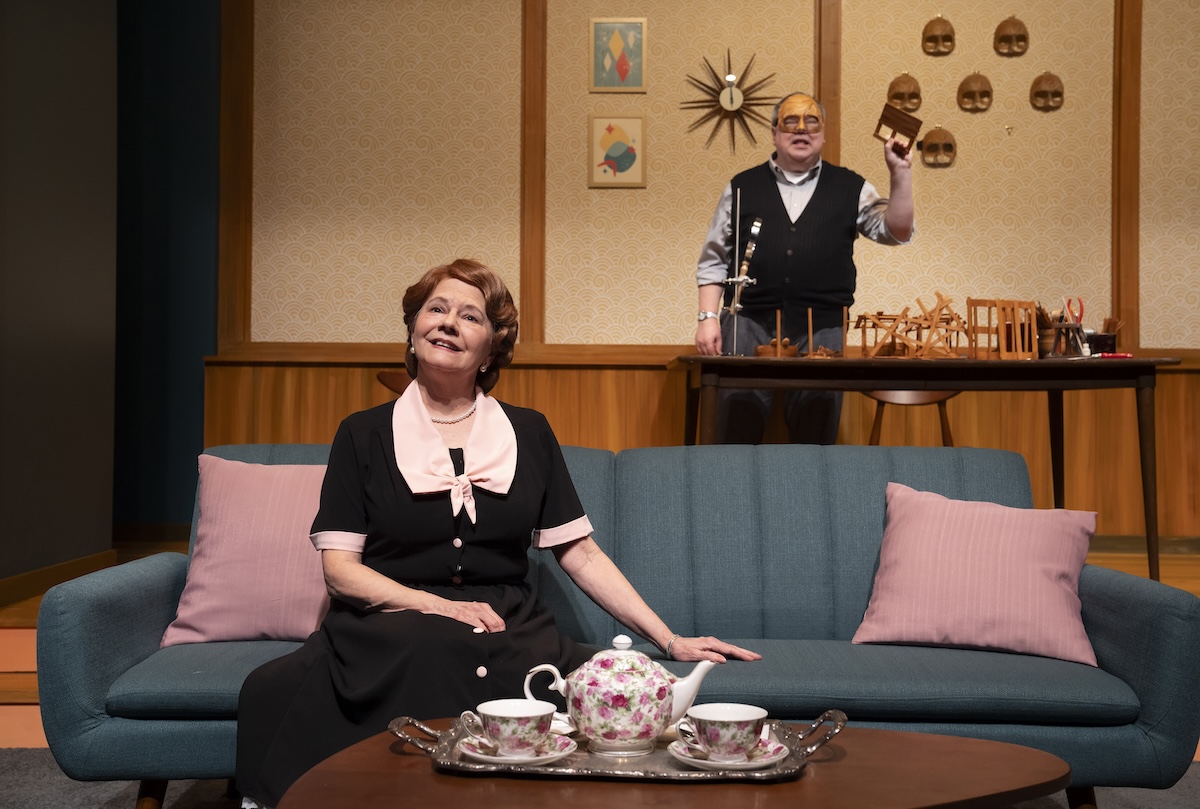
Playwright Deen’s script features plenty of examples of theater of the absurd and may even remind you of Thornton Wilder’s The Skin of Our Teeth with its climate disaster theme. His stage directions specify that Darren wears a mask that covers most of his face; the playwright notes that the mask is “something we see and he does not.” At times during the play, the wall behind Darren’s worktable becomes a window that displays clouds, a heavy rainstorm or other inclement weather. (Projection design is by Smooch Medina.)
Chicago theater veterans Reiter (London Road, Rose) and Ward (Rock n Roll, Chimerica) provide compelling, realistic performances as Edith and Darren. (I almost didn’t recognize Ward without his mustache.) Collins’ and Patin’s roles are smaller but give them the opportunity to display their comic talents.
Lauren Nichols’ scenic design perfectly represents a mid-century living room (that starburst wall clock!), properly lit by Jared Gooding. Danny Rockett’s sound design, which we always appreciate in his role as resident sound designer at Trap Door Theatre, brings eerie and watery sounds as the flood approaches. Yvonne Miranda’s costume designs are especially clever in preparing Edith and Darren Junior for the watery end of the world. I also admired her choice of Edith’s spectator pumps.
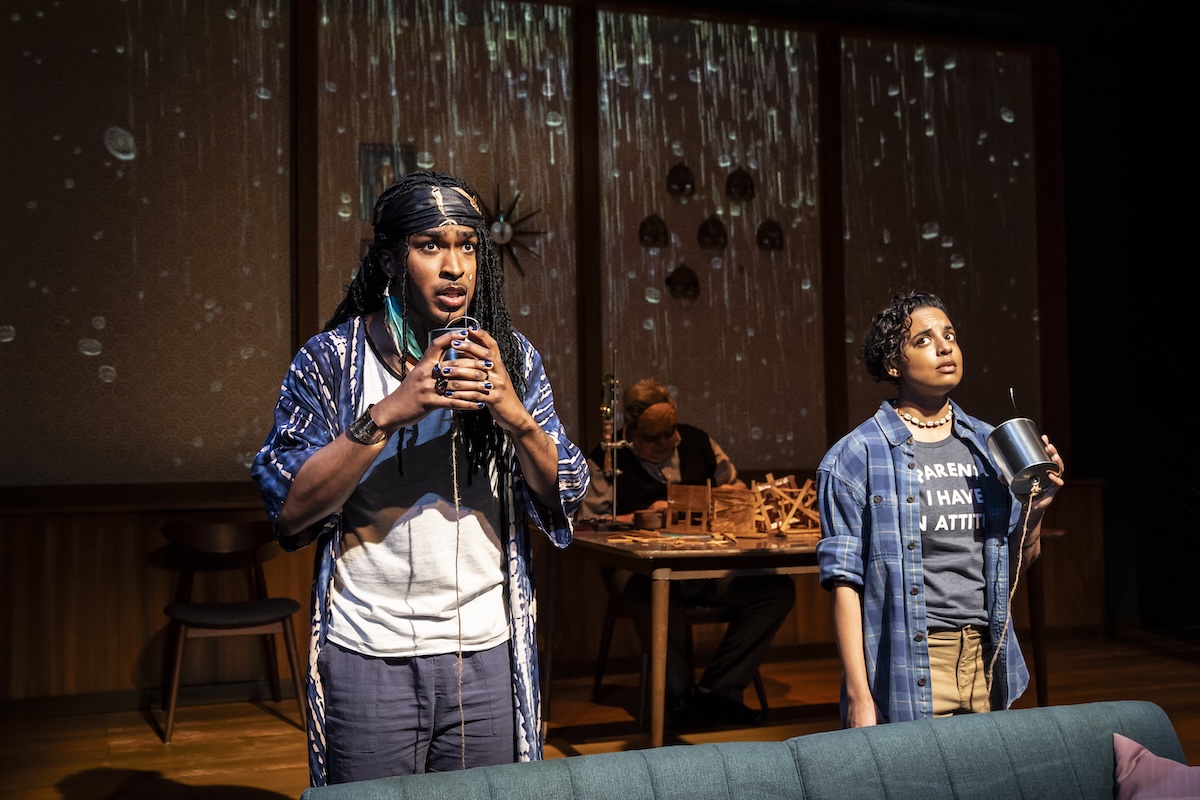
Deen’s script shows his talent for sharp, witty dialogue and realistic character conflict. His other plays include The Betterment Society, The Vessel and The Shaking Earth. Director Prestininzi directed Flood in its world premiere at Kansas City Rep in 2022; Chicago actors Laura Fisher and Matt DeCaro starred. He teaches at Connecticut College and the National Theater Institute and has directed plays across the US and in other countries.
Flood by Shattered Globe Theatre continues through March 9 at Theater Wit, 1229 W. Belmont. Running time is 90 minutes with no intermission. Tickets are $15-$52 for performances Thursday-Sunday. Buy tickets and get more info at sgtheatre.org or call the Theater Wit box office at 773-975-8150,
For more information on this and other plays, see theatreinchicago.com.
But the highlight of the evening was its centerpiece, “Forever” — quite easily the strangest opera I’ve ever seen. Rather than dig into humanity for material, composer Elizabeth Gartman and librettist Melisa Tien dispose of it altogether, opting instead for a world populated by humanistic petrochemicals and tenacious microorganisms.
Thus, “Forever” stages a meet-cute of sorts at an abandoned superfund site between two star-crossed polyfluoroalkyl substances — one derived from an Applebee’s Quesadilla Burger Wrapper (soprano Teresa Perrotta), the other left over from an Apple Watch Ultra Wristband (tenor Sahel Salam). Into this solution enters a temptress, Tardigrade (contralto Cecelia McKinley), the last of her kind, who threatens their budding love by luring one of the polyfluoroalkyl substances into a crater of liquid mercury. We’ve all been there.
Review by Michael Andor Brodeur for the Washington Post

On Friday night at the Kennedy Center’s Terrace Theater, three new operas took their first steps as part of the American Opera Initiative (AOI), the Washington National Opera’s enduring incubator program for young teams of composers and librettists.
Under the guidance of three mentors — conductor David Bloom, playwright and librettist Deborah Brevoort, and composer (and AOI alumnus) Kamala Sankaram — the creative duos are tasked with turning one year of work into 20 minutes of opera. This is no small challenge on two fronts. For one, fully staged operas can require several years of development before they even graze a stage. For another, 20 minutes of time has all the flexibility of an iron bar. Bending it into a narrative arc is nothing short of a feat of strength.
As test kitchens go, the AOI has a strong track record. Now in its 11th season, the initiative has commissioned more than 40 operas and mentored dozens of creative teams, more than half of whom continue to work together. Damien Geter and Lila Palmer’s “American Apollo,” for instance, first emerged as a short for AOI in 2021 and will receive its fully staged world premiere by Des Moines Metro Opera in July.
And although the lightning-round approach to opera taken by AOI produces mixed results each year, that’s sort of the point: Ideas set loose in these operas often seem like the products of either deep personal memories or flashes of sudden inspiration. They have a snapshot energy in an art form that must often endure the slow dry of an oil painting.
But, like a snapshot, short operas produced in a rush can also conspicuously lack the very elements that make opera work: artful framing, comprehensive orchestration and the time it takes to replace one reality with another.
With a strong ensemble of singers from the Cafritz Young Artists program singing the roles, and 13 players from the Washington National Opera Orchestra supplying the music from onstage, each of these short operas admirably managed to surmount the roughness and draftiness of a rough draft.
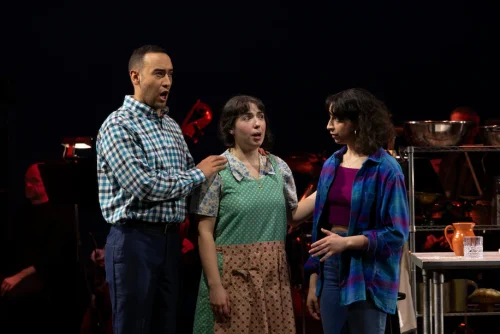
With “A Way Forward,” composer Laura Jobin-Acosta and librettist José Alba Rodríguez capture the crisis point of the family behind Panaderia Gabriel, a Mexican bakery in Queens specializing in conchas and facing imminent foreclosure. Appropriately, it’s a tale told with warmth and sweetness, even if its attempt to weave a multigenerational tapestry comes off a bit like hurried knitting.
Mezzo-soprano Winona Martin and soprano Kresley Figueroa whipped up instantly convincing chemistry as abuelita Helena and distractible granddaughter Julia — Rodríguez’s lithe lines effectively threading long traditions through simple details. (“Flour! Water! Butter! Cinnamon!”) The sturdy bass of Sergio Martínez served the financially stressed patriarch Gabriel well, despite the character’s sole emotional note as he strives to update the bakery with organic fruit juice, imported coffee and touch-screen menus.
Rodríguez suffuses his libretto with lovely detail and realism. And although some of the poetry was perplexing (“Your hand moves are in my blood”) and some of the expression wooden (“If we use social media, the word will spread!”), and although the characters sometimes felt more like avatars of motive than examples of people, Jobin-Acosta’s music bestowed an ease and vivacity that made the inner lives of the family easily accessible. “A Way Forward” could be a revelatory treat, given a bit more time to proof.
I was especially moved by “Hairpiece,” a smartly situated study of otherness from composer Joy Redmond and librettist Sam Norman. Centered on the Midtown Manhattan shop of veteran wig maker Esther, the story follows her encounter with 21-year-old Ari, an “aspiring artist questioning their gender and much else,” and the latter’s encounter with the widower Gale, “a young man wrecked by grief and early hair loss.”
Hair becomes the connective thread that intertwines the characters: Ari, splendidly and sensitively voiced by tenor Jonathan Pierce Rhodes, sports a cheap mop of bubble-gum pink. Gale, compassionately embodied by baritone Justin Burgess, dons a tragic rug. And Esther, sung by the standout soprano Tiffany Choe, tends to an exquisite $5,000 masterpiece on her workbench. In the hands of this trio, hair becomes a material of access, identity, desire and dignity.
Somehow, Redmond and Norman keep a multitude of emotional and melodic themes from tangling up in knots. Choe’s opening aria, “To Make a Wig,” was a bracing introduction to Redmond’s music and Norman’s poetry — each well-paced and keenly sharpened. Redmond is especially good at capturing the uncertain energy between strangers, a tension suspended in long lines of woodwind, blinks of piano, nervous pulses of percussion. And she’s a stunning singer, nimble and controlled.
And despite the heavy emotional stakes at play, the opera — brief as it was — was buoyed by a welcome lightness and a hopeful note. “Hairpiece” has great potential to tell a grander story about the many ways we become ourselves. Color me teased.
But the highlight of the evening was its centerpiece, “Forever” — quite easily the strangest opera I’ve ever seen. Rather than dig into humanity for material, composer Elizabeth Gartman and librettist Melisa Tien dispose of it altogether, opting instead for a world populated by humanistic petrochemicals and tenacious microorganisms.
Thus, “Forever” stages a meet-cute of sorts at an abandoned superfund site between two star-crossed polyfluoroalkyl substances — one derived from an Applebee’s Quesadilla Burger Wrapper (soprano Teresa Perrotta), the other left over from an Apple Watch Ultra Wristband (tenor Sahel Salam). Into this solution enters a temptress, Tardigrade (contralto Cecelia McKinley), the last of her kind, who threatens their budding love by luring one of the polyfluoroalkyl substances into a crater of liquid mercury. We’ve all been there.
Provided the apocalypse doesn’t arrive first, a wave of post-apocalyptic opera is approaching. In a production at 2023’s experimental Prototype Festival, Gelsey Bell’s “m??n?? [morning//mourning]” recently explored “a world in which all humans have disappeared from Earth.” And this month’s installment of Prototype featured the premiere of Roman Grygoriv and Illia Razumeiko’s “Chornobyldorf,” an opera in which “the remaining descendants of humanity find themselves in a post-societal world following the death of capitalism, opera, and philosophy.”
But Gartman and Tien’s approach to the end of days is refreshingly absurd and giddy with whimsy. Musically, “Forever” feels composed from the wreckage of the world it leaves behind — especially a portentous jingle that feels like a curse on the human folly of microplastics: “Plastic makes the world go round/ everywhere it can be found/ Fertilizer, hats, shampoo/ Even deep inside of you.”
As the three elements work to bond and discover a new mode of … polymer-amory (?), a new idea of what opera can do is quietly affirmed in “Forever.” Even when all might be lost in a hopeless desert of lifeless toxic sludge, the future feels bright.